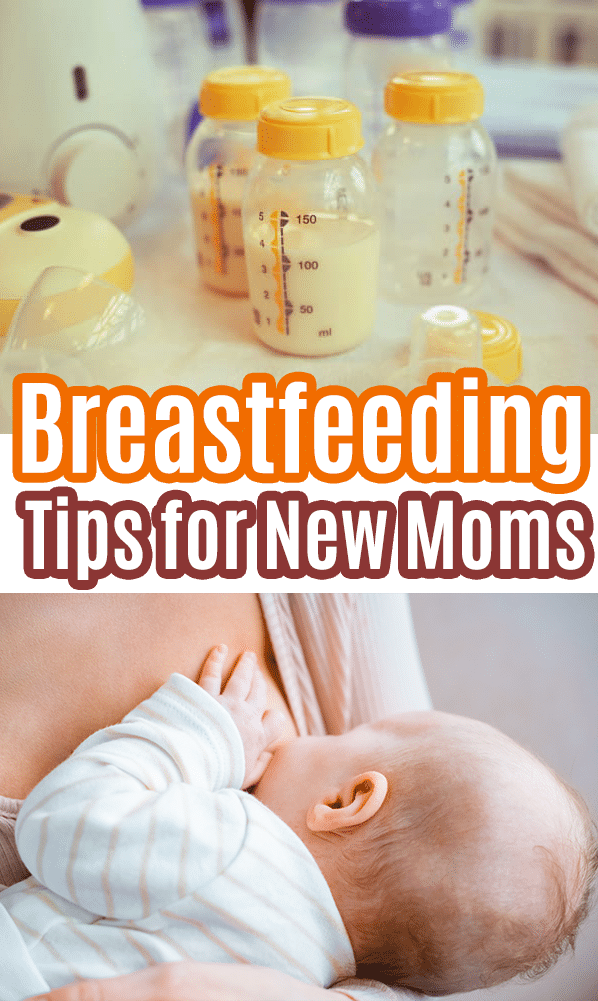When you’re a brand new mom, breastfeeding can feel really hard. You’re likely to want to give up a time or two! You’re frazzled, exhausted, and trying to adjust to a new baby.
Then when you add the everyday struggles of breastfeeding to it… you’ll start thinking you’re crazy for wanting to head down this journey. But rest assured mama, you can do this!
Keep reading and I’ll be sharing my top breastfeeding tips for new moms. (I am not a medical professional – just a mom who has breastfed 4 babies. Please seek a lactation consult or doctor if you have any issues or questions.)

Breastfeeding Tip #1: Follow your baby’s lead
The best thing you can do in those first weeks is follow your baby’s lead. While you’re still establishing your supply, it’s very important we listen to little babe.
One of the biggest reasons for mother’s getting frustrated and giving up is that they aren’t following baby’s lead and have the wrong expectations.
Feed on demand
Keep your eyes off that clock! Your baby will tell you when they’re hungry and want to nurse. They’ll start showing hunger cues like smacking their lips, sucking their hands, or even start rooting around looking for your breast.
Feeding on demand is very important for a number of reasons, including:
- It helps establish supply
- Your supply will come in sooner
- Helps baby regain weight faster
- Can potentially avoid jaundice
I’ve also shared some easy things to do while breastfeeding and some of my new mom must-haves which include a fun breastfeeding pillow. You are going to need a nursing pillow if you are going to..
Embrace comfort nursing
At some point you might think “they’re nursing a lot, are they even getting enough”, and the answer is yes. How often they nurse is a very poor indication of supply.
What they’re doing is often referred to as comfort nursing. This is when they are not trying to eat or pull milk from the breast, but rather suckling to get comfort. It helps them relax and adjust to their new world that exists outside the womb.
We will cover this more later, but it is very important to embrace it and not be tempted to introduce pacifiers or bottles right away. The more they nurse, the better your supply will be for them.
This now leads me to my next point…

Breastfeeding Tip #2: Try not to stress about milk supply
It’s natural to stress about milk supply and I’m certain every new mom does it, but do your best on feeding your baby and don’t stress too much if you can help it!
Stress level affects low milk supply
Milk supply is deeply affected by your stress or anxiety level and the more you stress, the less you can end up producing (source). There will be a number of things in life that stress is out, but when it becomes too much… it can affect breastfeeding.
When we stress, it releases a hormone that can inhibit supply, change the makeup of our milk, and even make letdowns more difficult.
The best thing you can do is relax, trust your body, and work on managing your stress level.
It’s okay if breastfeeding doesn’t work out!
If you’re stressing because you’re terrified you won’t be able to breastfeed, relax! Most women will be able to breastfeed assuming they have the proper support. But if you end up not being able to for whatever reason? That’s okay.
At the end of the day, the most important part is that your baby is fed and happy. (And that mama is free of extreme amounts of stress!)
And it doesn’t have to be all or nothing. You can totally supplement and still nurse your baby. Getting that precious breast milk is important but having a full, happy baby and mama is what matters most!
Breastfeeding Tip #3: Be patient while learning to breastfeed
There is this incorrect expectation that breastfeeding is supposed to be perfect from day 1. But the truth is – you’ll need to be patient while you learn to do this.
Breastfeeding is a learning process for both mom and baby. The single most important thing is to focus on having your baby on your breast for the first 6 weeks.

Don’t pump too soon
If you can help it… don’t rush into pumping. While it can help with relief if you become engorged, it can cause some serious supply issues too. You can end up overproducing and struggling to lower it.
There are circumstances in which this can’t be avoided, but try if possible.
Avoid introducing bottles or pacifiers
One of the more important tips here is to avoid other nipples for the first 6 weeks. Pacifiers and bottles can cause problems if your baby experiences nipple confusion.
If you’re not familiar with this term, Medela defines nipple confusion as, “when a breastfeeding baby is having trouble latching and breastfeeding effectively after being fed with a bottle.”
The different types of nipples can make baby very confused and struggle to latch onto the breast in the correct way while they’re in the middle of learning to master this new skill. It’s important that you hold off and maybe even avoid the introduction of these other items.
Speaking of latch, this leads me to my final breastfeeding tip…
Breastfeeding Tip #4: Check your baby’s latch
As I’ve previously mentioned, breastfeeding is a huge learning process – baby included. They might struggle with latching so it’s important that you check and help when needed.

Help them get a deep latch
The deeper the latch, the easier time they will have breastfeeding. If their latch is shallow, they will not be able to adequately pull milk from your breast (which can lead mom to think they have low supply and end up quitting breastfeeding).
So how do you help them get a deep latch?
You’ll want to follow these steps to get a nice deep latch for your baby:
- Hold onto your breast with one hand and baby’s back with the other and bring baby close enough that they can easily reach the nipple
- Tickle their upper lip with your nipple until they open up their mouth nice and wide (do not allow them to latch on until the mouth is wide enough)
- Latch the baby onto your breast and make sure they have a wide latch wrapped around your nipple.
Breastfeeding is also easier when you have found a proper position. Did you know there are 6 different positions you can try? I’d suggest trying them all until you find one that makes both you and your babe comfortable.
Keep an eye out for ties
If you still struggle with latching and feeding your baby, see if you can spot any ties! Lip and tongue ties can make breastfeeding incredibly difficult since they can’t move their lips and tongue around properly.
Do not try and make the diagnosis yourself, however. If you have a suspicion, contact your local lactation consultant who is trained in spotting ties. If babe does have a tie, it’s best to have it corrected as soon as possible.
Breastfeeding Tip #5: Drink Plenty of Water
One of the easiest things to do that will help with nursing is to drink plenty of water! You have to remember that in order for their to be liquid for the baby to drink (breast milk) there has to be liquid in your body to supply it. Drinking enough water is super important!

How much water to drink
I saw online once that you need to drink 1/2 ounce for every pound you weigh. So if you weight 150 pounds you need to drink 75 ounces of water a day.
Drink enough to stay hydrated. If you are feeling thirsty – you may already be dehydrated. These drinks will help keep you hydrated
Breastfeeding Tip #6: Eat the Right Food
As a nursing mom you also need to make sure you are eating enough of the right foods. The general rule is to eat 500 additional calories per day to help with milk production.
On top of eating an iron rich diet you could also try some lactation recipes to help with your supply. Some of my favorite lactation recipes are:
- no bake lactation bites
- monster lactation cookies
- no bake lactation cookies
- cookie dough lactation bites
It should be noted that lactation recipes can be made with or without brewers yeast – if you are sensitive to that. I’ve found that lactation recipes with brewers yeast are a great way to increase supply but that it’s only temporary. Follow the tips above for long term breastfeeding success!

Conclusion
I hope these top 6 breastfeeding tips help you as a new mom. The best thing you can do is follow your baby’s lead, try not to stress, be patient, and check on your baby’s latch.
Following your baby’s lead by feeding on demand and comfort nursing will make a world of difference. This is key in establishing your supply in those first few weeks.
As stressful as breastfeeding is, the best thing you can do is try your best not to stress. It can affect your supply and milk so trust your body and know it’s okay if it doesn’t work out!
Remember this is a learning process so be patient. Allow time for you and your baby to get the hang of things and don’t introduce bottles or pump too soon.
Work together to get a deep latch, try different breastfeeding positions, and get checked for ties if needed.
Above all else… keep going! Breastfeeding is hard at first, but you’ll be a pro before you know it. Have you tried any of these breastfeeding tips? Let me know if they helped you out in anyway by commenting below.
- White Chocolate Mousse - February 16, 2024
- Slow Cooker Ground Beef Tacos - October 30, 2023
- Pumpkin Cream Iced Chai Latte - October 23, 2023











Leave a Reply